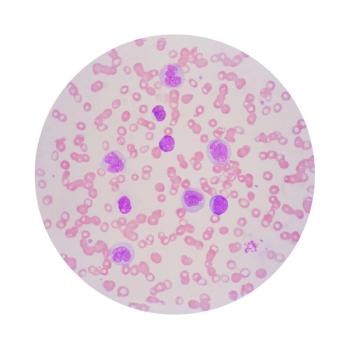
Studies with better data are still needed to fully understand the epidemiology of Duchenne muscular dystrophy (DMD), according to a recently published review.

Studies with better data are still needed to fully understand the epidemiology of Duchenne muscular dystrophy (DMD), according to a recently published review.

Patients with sickle cell disease who do not receive treatment can die from the disease, but diagnostic resources are scarce in some parts of the world where the disease is most prevalent. A new smartphone-based method could change that.

Today, there is a broader understanding of asthma, including the genetic, environmental, and host-related factors that contribute to declining lung function in patients.

Research at the European Hematology Association featured zanubrutinib as monotherapy and in combination with rituximab, and well as evaluations of biomarkers that signal responses.

Researchers warned that financial incentives that focus on a percentage of pathway compliance could “paradoxically harm the quality of care."

Patients with relapsed/refractory T-cell lymphoblastic leukemia face poor outcomes, and are generally treated by salvage therapy followed by allogeneic hematopoietic stem cell transplant. A new study suggests an optimal option for salvage therapy.

Experiments with the protein Cx43 show that it could be a "druggable target" to prevent renal decline.

Authors of an opinion piece concluded that not only are immunosuppressed patients with psoriasis not at an increased risk of developing serious complications related to coronavirus disease 2019 (COVID-19), their medications may help mitigate potential issues.

A subset of patients taking ibrutinib as a therapy for chronic lymphocytic leukemia (CLL) will require dose modifications. A new study attempts to evaluate the impacts of such changes, though the authors find many questions remain unsolved.

The challenges in precision oncology in gastric cancer is driven by its inter- and intra-tumoral heterogeneity, leaving chemotherapy as the standard of care.

Two abstracts presented at the European Congress of Rheumatology of the European League Against Rheumatism reviewed long-term safety data and real-life effectiveness and safety of secukinumab for ankylosing spondylitis, psoriasis, and psoriatic arthritis.

The advice comes a week before Donald Trump seeks to hold an indoor re-election rally for his presidential campaign in Tulsa, Oklahoma.

Alcohol consumption was found to contribute to the lowest oxygen saturation observed among patients at risk of snoring and obstructive sleep apnea, with additional associations linked to worsening severity of snoring and impaired sleep architecture in select groups, according to study findings.

Study results show a 4% mortality rate among HIV-positive patients who have coronavirus disease 2019 (COVID-19) compared with approximately 17% of patients who also have COVID-19 but are HIV-negative.

Coverage of our peer-reviewed research and news reporting in the health care and mainstream press.

A special enrollment period provides an opportunity to those recently unemployed and without insurance with possibility of health coverage; several states reporting rises in cases, hospitalizations due to coronavirus disease 2019; US blood reserves reaching critically low levels.


A data analysis of real-world data found that the rise of orphan drugs (ODs) in the Republic of Korea has not solved all patient accessibility issues as budget concerns can make it difficult to justify reimbursements.

Three abstracts presented at this year’s annual meeting of the American Society of Clinical Oncology focused on cardiotoxic effects of cancer treatment and how cardiac disease remains a barrier to effective cancer therapy among patients with cancer and survivors.

This week, the top managed care news included HHS distributing COVID-19 funds to Medicaid and CHIP providers; the National Kidney Foundation issues a statement on health disparities and racial violence; a preview of our coverage of the American Diabetes Association 2020 Virtual Scientific Sessions.

Recently, cardiorenal outcomes have gained attention, as SGLT2 inhibitors in particular have been shown to prevent renal decline and reduce the risk of patients with type 2 diabetes (T2D) progressing to kidney failure

Self-reported high levels of physical activity shared a positive correlation with improved mortality and care for patients who underwent chest CT scans for atherosclerosis.

Patients with psoriasis often have other physical diseases, and these somatic comorbidities can have a bigger effect on the patient’s mental health than the skin symptoms from their psoriasis, according to a study published in JAMA Dermatology.

The findings in this study uncovered some critical gaps in asthma care that are linked to worse outcomes.

A 20-year follow-up comprising a secondary analysis to an original study shows that high-dose chemotherapy plus hematopoietic stem cell transplant benefit patients with high-risk stage III disease with 10 or more axillary lymph nodes involved.

In his prior role at CareMore Health, Sachin Jain, MD, MBA, launched a Togetherness initiative to address isolation that leads to health problems among seniors.


A spotlight has been placed on the mental health of black American youth amid growing social unrest and disproportionate effects of coronavirus disease 2019 (COVID-19); cases of COVID-19 in the United States reached 2 million yesterday; CMS advises nursing home residents know their rights amid allegations of stimulus check theft..

A new large randomized trial indicates induction therapy including lenalidomide is optimal in patients with multiple myeloma who are transplant-eligible. Maintenance with lenalidomide was preferable to observation alone following transplant.

Up to 30% of cases of dysanapsis, having a small airway-to-lung ratio, occur in people who have never smoked, while not having the condition could explain why some heavy smokers never develop chronic obstructive pulmonary disease (COPD).

259 Prospect Plains Rd, Bldg H
Cranbury, NJ 08512
© 2025 MJH Life Sciences®
All rights reserved.
